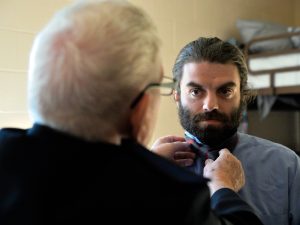How much time do you regularly spend engaging with the Bible?
As for what was sown on good soil, this is the one who hears the word and understands it. He indeed bears fruit and yields, in one case a hundredfold, in another sixty, and in another thirty (Matt. 13.23 ESV).
I’m not the keenest of gardeners. I’ve grown vegetables but I enjoy eating them far more. What I do know is that seeds by themselves don’t have the potential for becoming something beautiful. It is the planting of and investing in them, making sure that they have rich soil and are well watered, that helps them to grow and produce fruit. The same can be said of the seeds of the gospel we find in the Bible. We shouldn’t just read the Bible; we should also allow it to germinate and grow in us.
I’ve been a disciple who has devoted about 24 years of my life to Jesus. In that time, I’ve had seasons during which I’ve really invested in reading the Bible and other seasons less so. As each year passes, and my understanding and knowledge of Jesus develops, I’ve started to see deeper and deeper truths and patterns in the Bible that germinate and grow in me. The more I feed on the Bible, the more fruit I see in my life. Knowledge in itself is helpful but it can make us historians of Jesus, rather than disciples, unless we allow it to transform our lives.
For many years in the Church, it has commonly been said:
If we have the word of God without the Spirit of God: we dry up;
if we have the Spirit of God without the word of God: we blow up;
but if we have the word of God and the Spirit of God: we grow up.
The Franciscan friar Richard Rohr writes in his blog, Belief or Discipleship, that we do not think ourselves into a new way of living, but we live ourselves into a new way of thinking.
I’m not suggesting that theory and theology are unimportant; but I believe that faith is more about how we live on a daily basis…[M]y life’s work…has been trying to move heady doctrines and dogmas to the level of actual experience and lifestyles. The question is, are we willing to activate the teachings and life of Jesus in our lives? Doing so may cause people to look at us and think for a moment that they are with Jesus himself.
Incorporating what we learn about Jesus into a living experience can be a challenge. Sometimes we might not see the connection between Jesus’ world and ours. In such a moment, we may just have to take a step back to look at the bigger picture.
The Bible tells us that Jesus fed 5,000 people. Although we might not ever face a catering challenge that large, we might have a “faith-needs-expanding” situation in our lives. Every passage of the Bible has many applications because the Holy Spirit will reveal to each of us different truths that are applicable to our own unique situations.
There are several ways of activating the teaching of the Bible, but the easiest is simply to pause and take a moment to pray. Ask the Holy Spirit to speak to you through the passage as you read it. Once you have done so, ask yourself, “What is God showing me through this passage? What is jumping out at me?”
Many passages are stories told with a principle to learn or to activate in our lives. These stories help us to see humanity’s failings and God’s actions. Some are direct teachings that simply have to be applied. Sometimes a passage declares a truth about God, and the appropriate response is to allow this truth to shape how we see him and wonder at his power and might.
Yes, but how?
Taking the teachings of Jesus and activating them in our day-to-day lives requires us to ask questions of ourselves. Each day, I start by taking a short, focused retreat (with a cup of coffee and my Bible in a quiet corner and hitting pause). We can be so consumed by the present that we forget to focus on the eternal. Try taking a six-minute retreat that will help to build your relationship with God (see the 3-2-1 daily retreat overview below). It is this daily rhythm that not only sustains us but also transforms us into the likeness of Jesus.
How to hold your 3-2-1 daily retreat
Three minutes: Bible
Take out your Bible—either a printed or a digital one. Read a short passage, bit by bit, to allow yourself to take it in. If this is your first time reading the Bible, a good place to start is with a Gospel, followed by the book called the Acts of the Apostles (or, simply, Acts).
Alternatively, read a passage from a Bible study guide or start with a Bible structured to be read in a year (for example, The Bible in One Year).
As you read the short passage, ask yourself these three questions:
- What does this tell me about God?
- What does this tell me about me?
- What can I do to live out what I’ve read?
Two minutes: Pray
Either in your mind or out loud, simply say what is happening in your life. Give thanks in addition to sharing your needs. You can start by saying something simple such as, “Hello, God,” “Dear Father God” or “God, come and find me.” Then just go for it.
One minute: Listen
God wants to talk to you, as well as listen. Take a moment to listen to him too. Sometimes you might get a sense of what he is saying. Some people experience an emotion; you might just feel his presence. This is all positive and part of knowing God. If you hear or feel nothing, don’t worry. Sit still with God.
When you are ready to end, say “Amen” (which means “so be it”).
After each six-minute retreat, you might like to try to set a goal to try to live out the revealed truth from the passage. Goals should be SMART: Specific (something clear that you know you can do); Measurable (something that you can see you have completed); Achievable (something that is not so big you will never do it); Relevant (the goal should make sense for your situation); Time-bound (something that you can do in a day or a week, so that the task is not long-drawn-out). This way we know what we are going to try, how it relates to our lives and when we have done it.
Adapted from Apprentice to Jesus: 40 Days of Walking in the Way (SPCK, 2021) by Cris Rogers. Used with permission.
Do Good:
- Read “Apprentice to Jesus: 40 Days of Walking in the Way” (SPCK, 2021) by Cris Rogers.
- See how you can get involved in the Fight for Good with The Salvation Army.













